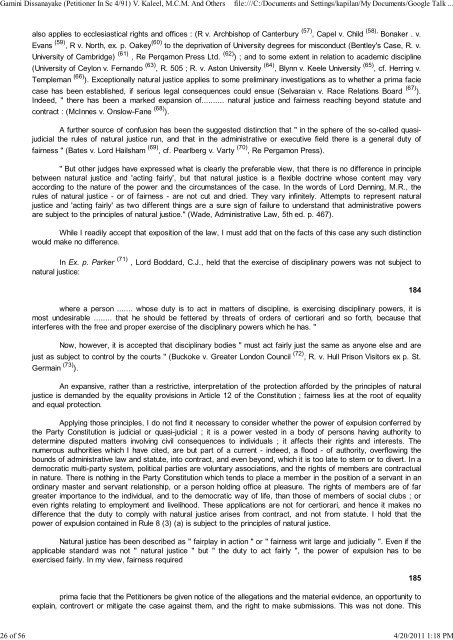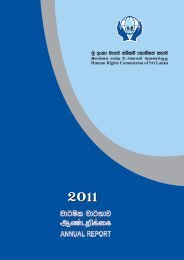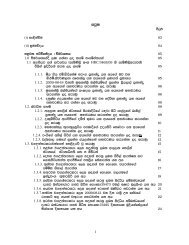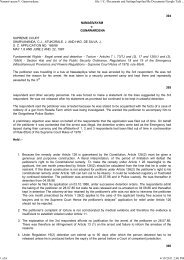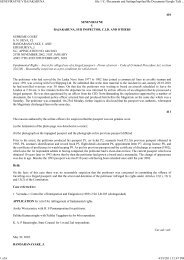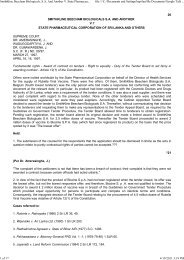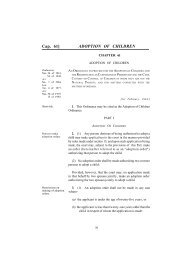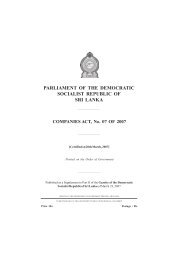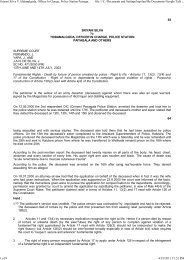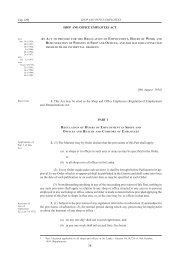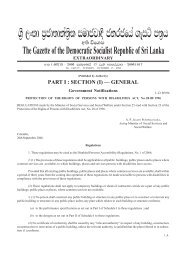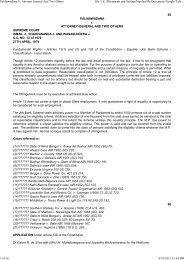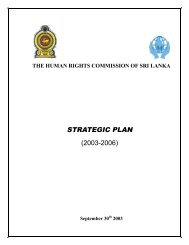Gamini Dissanayake (Petitio... - Human Rights Commission of Sri ...
Gamini Dissanayake (Petitio... - Human Rights Commission of Sri ...
Gamini Dissanayake (Petitio... - Human Rights Commission of Sri ...
You also want an ePaper? Increase the reach of your titles
YUMPU automatically turns print PDFs into web optimized ePapers that Google loves.
<strong>Gamini</strong> <strong>Dissanayake</strong> (<strong>Petitio</strong>ner In Sc 4/91) V. Kaleel, M.C.M. And Others file:///C:/Documents and Settings/kapilan/My Documents/Google Talk ...<br />
also applies to ecclesiastical rights and <strong>of</strong>fices : (R v. Archbishop <strong>of</strong> Canterbury (57) , Capel v. Child (58), Bonaker . v.<br />
Evans (59) , R v. North, ex. p. Oakey (60) to the deprivation <strong>of</strong> University degrees for misconduct (Bentley's Case, R. v.<br />
University <strong>of</strong> Cambridge) (61) , Re Perqamon Press Ltd. (62) ) ; and to some extent in relation to academic discipline<br />
(University <strong>of</strong> Ceylon v. Fernando (63) , R. 505 ; R. v. Aston University (64) , Blynn v. Keele University (65) , cf. Herring v.<br />
Templeman (66) ). Exceptionally natural justice applies to some preliminary investigations as to whether a prima facie<br />
case has been established, if serious legal consequences could ensue (Selvaraian v. Race Relations Board (67) ).<br />
Indeed, " there has been a marked expansion <strong>of</strong>.......... natural justice and fairness reaching beyond statute and<br />
contract : (McInnes v. Onslow-Fane (68) ).<br />
A further source <strong>of</strong> confusion has been the suggested distinction that " in the sphere <strong>of</strong> the so-called quasijudicial<br />
the rules <strong>of</strong> natural justice run, and that in the administrative or executive field there is a general duty <strong>of</strong><br />
fairness " (Bates v. Lord Hailsham (69) , cf. Pearlberg v. Varty (70) , Re Pergamon Press).<br />
" But other judges have expressed what is clearly the preferable view, that there is no difference in principle<br />
between natural justice and 'acting fairly', but that natural justice is a flexible doctrine whose content may vary<br />
according to the nature <strong>of</strong> the power and the circumstances <strong>of</strong> the case. In the words <strong>of</strong> Lord Denning, M.R., the<br />
rules <strong>of</strong> natural justice - or <strong>of</strong> fairness - are not cut and dried. They vary infinitely. Attempts to represent natural<br />
justice and 'acting fairly' as two different things are a sure sign <strong>of</strong> failure to understand that administrative powers<br />
are subject to the principles <strong>of</strong> natural justice." (Wade, Administrative Law, 5th ed. p. 467).<br />
While I readily accept that exposition <strong>of</strong> the law, I must add that on the facts <strong>of</strong> this case any such distinction<br />
would make no difference.<br />
In Ex. p. Parker (71) , Lord Boddard, C.J., held that the exercise <strong>of</strong> disciplinary powers was not subject to<br />
natural justice:<br />
where a person ....... whose duty is to act in matters <strong>of</strong> discipline, is exercising disciplinary powers, it is<br />
most undesirable ........ that he should be fettered by threats <strong>of</strong> orders <strong>of</strong> certiorari and so forth, because that<br />
interferes with the free and proper exercise <strong>of</strong> the disciplinary powers which he has. "<br />
Now, however, it is accepted that disciplinary bodies " must act fairly just the same as anyone else and are<br />
just as subject to control by the courts " (Buckoke v. Greater London Council (72) , R. v. Hull Prison Visitors ex p. St.<br />
Germain (73) ).<br />
An expansive, rather than a restrictive, interpretation <strong>of</strong> the protection afforded by the principles <strong>of</strong> natural<br />
justice is demanded by the equality provisions in Article 12 <strong>of</strong> the Constitution ; fairness lies at the root <strong>of</strong> equality<br />
and equal protection.<br />
Applying those principles, I do not find it necessary to consider whether the power <strong>of</strong> expulsion conferred by<br />
the Party Constitution is judicial or quasi-judicial ; it is a power vested in a body <strong>of</strong> persons having authority to<br />
determine disputed matters involving civil consequences to individuals ; it affects their rights and interests. The<br />
numerous authorities which I have cited, are but part <strong>of</strong> a current - indeed, a flood - <strong>of</strong> authority, overflowing the<br />
bounds <strong>of</strong> administrative law and statute, into contract, and even beyond, which it is too late to stem or to divert. In a<br />
democratic multi-party system, political parties are voluntary associations, and the rights <strong>of</strong> members are contractual<br />
in nature. There is nothing in the Party Constitution which tends to place a member in the position <strong>of</strong> a servant in an<br />
ordinary master and servant relationship, or a person holding <strong>of</strong>fice at pleasure. The rights <strong>of</strong> members are <strong>of</strong> far<br />
greater importance to the individual, and to the democratic way <strong>of</strong> life, than those <strong>of</strong> members <strong>of</strong> social clubs ; or<br />
even rights relating to employment and livelihood. These applications are not for certiorari, and hence it makes no<br />
difference that the duty to comply with natural justice arises from contract, and not from statute. I hold that the<br />
power <strong>of</strong> expulsion contained in Rule 8 (3) (a) is subject to the principles <strong>of</strong> natural justice.<br />
Natural justice has been described as " fairplay in action " or " fairness writ large and judicially ". Even if the<br />
applicable standard was not " natural justice " but " the duty to act fairly ", the power <strong>of</strong> expulsion has to be<br />
exercised fairly. In my view, fairness required<br />
prima facie that the <strong>Petitio</strong>ners be given notice <strong>of</strong> the allegations and the material evidence, an opportunity to<br />
explain, controvert or mitigate the case against them, and the right to make submissions. This was not done. This<br />
26 <strong>of</strong> 56 4/20/2011 1:18 PM<br />
184<br />
185


